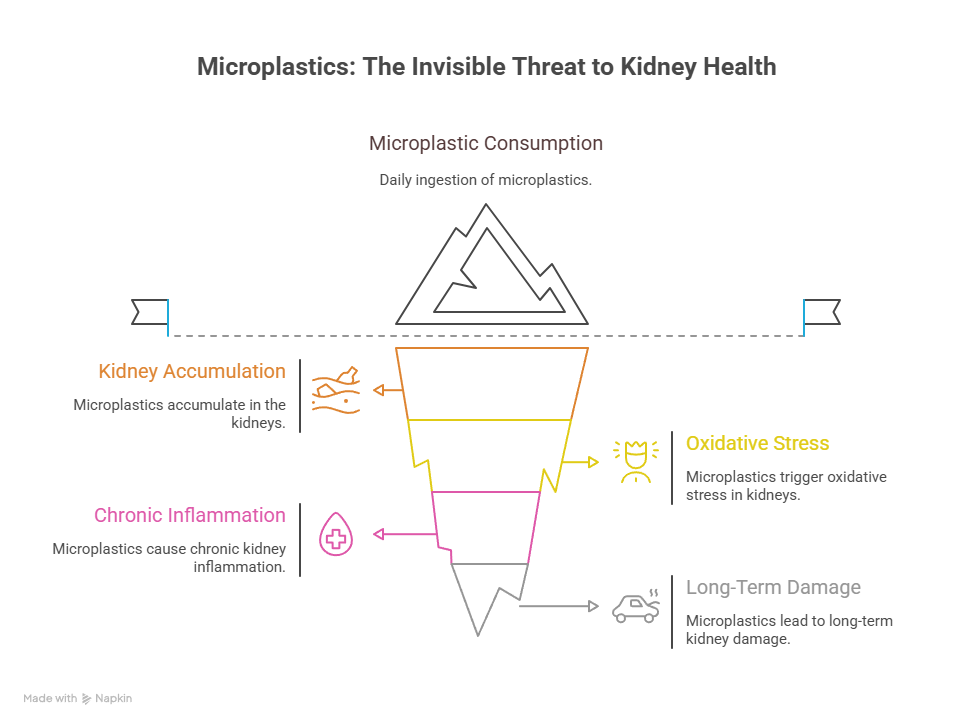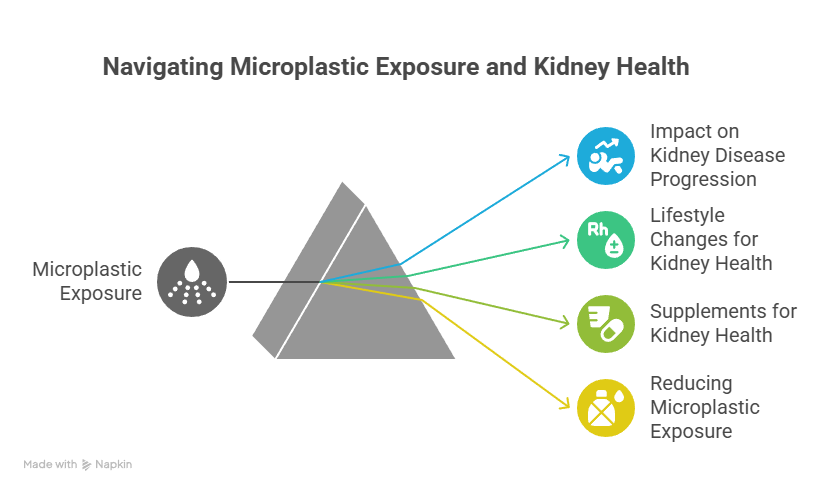
Introduction: A Modern-Day Toxin Hiding in Plain Sight
We live in a world surrounded by plastic. From water bottles and food packaging to clothing and household items, plastic has become deeply embedded in our daily lives. What most of us do not realize is that these plastics break down into microscopic particles called microplastics. These invisible fragments are now being detected everywhere—our air, water, soil, and even inside the human body.
The unsettling truth is that we are consuming and inhaling microplastics every single day. While scientists are still uncovering the full health consequences, one area of growing concern is their impact on kidney health. The kidneys, our body’s natural filtration system, are especially vulnerable to toxins. Emerging evidence suggests that microplastics may accumulate in the kidneys, triggering oxidative stress, chronic inflammation, and long-term damage that may contribute to chronic kidney disease.
This is not just an environmental issue; it is a deeply personal health issue. Understanding the hidden threat of microplastics gives us the power to take proactive steps toward protecting our bodies, our kidneys, and ultimately, our future.
The Pervasiveness of Microplastics: What You Cannot See Can Harm You
When most people hear the term “plastic pollution,” they think of bottles and bags floating in the ocean. But plastics degrade over time, breaking into particles less than 5 millimeters in size. These are known as microplastics. Even smaller fragments, called nanoplastics, are so tiny they can enter our cells and tissues with ease.
Microplastics have been detected in:
- Drinking water: Both bottled and tap water contain particles. Bottled water, ironically thought to be safer, often carries a higher microplastic load due to leaching from the packaging itself.
- Food: Seafood, salt, packaged foods, and even fresh produce exposed to polluted soil and water have been found to contain microplastics.
- Air: Synthetic fibers from clothing and textiles release particles into indoor and outdoor air, which we inhale daily.
- Household items: Cooking utensils, storage containers, and non-stick cookware may release microplastics when exposed to heat.
While the average person may ingest tens of thousands of particles annually, some studies estimate it could be closer to hundreds of thousands depending on lifestyle. The bottom line: exposure is unavoidable. The question becomes, how does this accumulation affect our health—especially the kidneys?
How Microplastics Harm the Kidneys
Your kidneys filter approximately 50 gallons of blood each day, removing waste, balancing electrolytes, and regulating fluid levels. This makes them one of the most vital organs for maintaining internal balance. Unfortunately, they are also highly vulnerable to toxic overload.
Here are the key mechanisms by which microplastics may damage the kidneys:
- Oxidative Stress
Microplastics contain chemical additives like phthalates, bisphenol A (BPA), and heavy metals that can leach into the bloodstream. These chemicals generate free radicals—unstable molecules that damage cells and tissues. The kidneys, constantly filtering blood, are prime targets for this oxidative stress, leading to cell injury and eventual dysfunction. - Chronic Inflammation
When microplastics or their byproducts accumulate in kidney tissue, the immune system recognizes them as foreign invaders. This triggers a persistent inflammatory response. Chronic inflammation gradually scars kidney tissues, impairs their filtering capacity, and sets the stage for fibrosis. - Fibrosis and Scarring
Fibrosis is the hardening or thickening of tissue due to prolonged inflammation. In the kidneys, fibrosis reduces elasticity, restricts blood flow, and diminishes the organ’s ability to filter waste. Over time, this may progress toward chronic kidney disease. - The Gut-Kidney Connection
Microplastics also disrupt gut health, altering the microbiome balance and damaging the intestinal barrier. This increases intestinal permeability (sometimes called leaky gut), allowing toxins and microplastic particles to enter the bloodstream. Once circulating, they can lodge in organs like the kidneys, amplifying inflammation and oxidative stress through the gut-kidney axis.
Microplastics and the Bigger Picture of Kidney Disease
Chronic kidney disease (CKD) is already a growing public health crisis worldwide, often fueled by diabetes, hypertension, and inflammation. The possibility that microplastics are adding a hidden burden makes prevention even more urgent.
For individuals already struggling with kidney disease, exposure to microplastics can accelerate progression. Those with conditions like IgA nephropathy, focal segmental glomerulosclerosis (FSGS), or diabetic kidney disease may be especially vulnerable to the additional inflammatory and oxidative stress burden posed by microplastic exposure.
Here, lifestyle changes and supplements for kidney health Houston patients are turning to can provide added support. Certain evidence-based nutrients like omega-3 fatty acids, antioxidants, and herbal formulations may help reduce inflammation and support filtration efficiency alongside dietary and lifestyle modifications.
Even for people without pre-existing conditions, the long-term accumulation of microplastics raises concerns about silent, gradual harm. Just as smoking was once overlooked as a health hazard, microplastics may prove to be one of the overlooked culprits of our generation’s chronic disease epidemic.

Practical Steps for Reducing Microplastic Exposure
While eliminating all microplastic exposure is impossible, you can significantly reduce your daily intake and support your body’s ability to process environmental toxins.
1. Rethink Food and Beverage Storage
- Replace plastic containers with glass, stainless steel, or ceramic.
- Avoid microwaving food in plastic, as heat accelerates leaching.
- Choose fresh, unpackaged foods whenever possible instead of heavily packaged items.
2. Upgrade Your Water Source
- Invest in a high-quality water filter designed to reduce microplastic particles and chemical contaminants.
- Prefer filtered tap water over bottled water.
3. Mind Your Cooking Habits
- Use stainless steel, cast iron, or ceramic cookware instead of non-stick pans.
- Store hot foods and drinks in non-plastic containers.
4. Be Conscious with Clothing
- Wash synthetic fabrics less frequently or use a microfiber-catching laundry bag.
- Choose natural fibers such as cotton, hemp, or wool.
5. Support Your Detoxification Pathways
Your body has built-in detoxification systems that can be strengthened with healthy choices:
- Eat antioxidant-rich foods such as leafy greens, berries, and cruciferous vegetables.
- Stay well-hydrated to support efficient kidney filtration.
- Engage in regular physical activity.
- Prioritize gut health with probiotic-rich foods and fiber.
For additional support, supplements for kidney health Houston specialists recommend may help neutralize oxidative stress and enhance kidney resilience. Always consult with a functional medicine provider to personalize supplementation safely.
6. Mindful Consumer Choices
Every purchase is a vote. By reducing plastic use in your home and choosing sustainable alternatives, you not only protect your health but also contribute to lowering the global burden of plastic pollution.
A Functional Medicine Perspective
Functional medicine takes a root-cause approach to kidney health. From this lens, microplastics represent an environmental toxin that interacts with other factors such as diet, stress, genetics, and existing chronic conditions. Instead of addressing kidney damage after it occurs, functional medicine emphasizes prevention, early identification of risk factors, and personalized strategies—including the use of supplements for kidney health Houston patients can access to help lower toxic load.
This perspective is empowering because it shifts the conversation from despair to action.
Conclusion: Protecting Your Kidneys, Protecting Your Future
Microplastics are a hidden threat, silently infiltrating our bodies and placing additional stress on the kidneys. Yet knowledge is power. By understanding how these particles contribute to oxidative stress, inflammation, and kidney dysfunction, you gain the ability to make informed choices that protect your health.
Your kidneys are resilient, but they need your support. Through mindful changes in diet, lifestyle, and evidence-based supplements for kidney health Houston, you can take meaningful steps to reduce your exposure and enhance your body’s ability to detoxify.
This is not just about kidney health—it is about reclaiming agency in a world that often feels overwhelming. Every decision you make to reduce microplastics is an investment in your longevity, vitality, and alignment with values that prioritize both personal and planetary wellness.
Three Key Takeaways
- Microplastics are pervasive in food, water, air, and household items, and they accumulate in organs like the kidneys.
- These particles contribute to oxidative stress, chronic inflammation, and fibrosis, with the gut-kidney axis playing a central role.
- Protect yourself through practical steps—minimizing plastic use, upgrading water filtration, and considering functional approaches like supplements for kidney health Houston.
